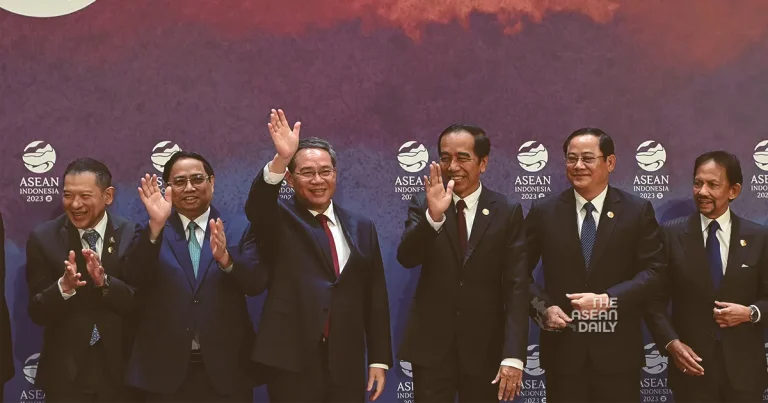7-9-2023 (JAKARTA) Leaders from China and the Association of Southeast Asian Nations (ASEAN) signed multiple agreements on Wednesday, solidifying the economic cooperation between the two entities. The signing took place during the ASEAN-China Summit in Jakarta, which was attended by Chinese Premier Li Qiang. These agreements included plans to make agriculture a new growth engine and ensure food security in the region.
Indonesian Foreign Minister Retno Marsudi confirmed the signing of these documents and highlighted the upgrade of the ASEAN-China free trade agreement, referred to as “3.0.” This upgrade encompasses new cooperation in areas such as the digital economy, green economy, and supply chain. However, the controversy surrounding China’s new territorial map was not discussed during the summit.
Premier Li also took the opportunity to test ride the China-backed Jakarta-Bandung high-speed railway, set to commence commercial service in October. Luhut Pandjaitan, Indonesia’s coordinating minister for maritime affairs and investment, who accompanied Li on the ride, expressed China’s interest in getting involved in another plan to extend the railway line to Surabaya, the largest city in East Java province. Pandjaitan emphasized China’s experience in building high-speed rail and suggested considering a partnership with China for this project.
In contrast, the ASEAN-U.S. Summit, where U.S. President Joe Biden was absent and represented by Vice President Kamala Harris, did not yield significant outcomes. Harris reiterated the defense and deterrent commitments of the U.S. in the region and emphasized ASEAN’s central role in America’s commitment to the Indo-Pacific. She announced plans to establish the first-ever U.S.-ASEAN Center in Washington, which aims to enhance engagement and facilitate exchanges between people, businesses, and academic institutions.
During a bilateral meeting with Indonesian President Joko Widodo, Harris stated that the U.S. would continue working with Indonesia to establish a resilient supply chain, including critical minerals for expanding clean energy economies. On Thursday, Harris and Premier Li are scheduled to participate in the East Asia Summit, which includes ASEAN leaders and several dialogue partners, such as Australia, India, Japan, New Zealand, Russia, and South Korea.
Teuku Rezasyah, an international relations expert at Indonesia’s Padjadjaran University, recognized the U.S. as a geopolitical and security leader in the Indo-Pacific region. Rezasyah cited ongoing multinational military drills, Super Garuda Shield, led by the U.S. and Indonesia as evidence of U.S. influence. However, he acknowledged China’s extraordinary economic influence through trade, investment, and infrastructure partnerships with ASEAN countries. Rezasyah suggested that the U.S. should take the lead through strategic and practical cooperation in the region.
The absence of public statements from ASEAN leaders directly addressing China’s new territorial map during the ongoing summits indicates a reluctance to jeopardize the meetings. According to a senior diplomat, ASEAN leaders expressed disappointment over Biden’s absence, with Indonesia, this year’s ASEAN chair, expressing shock and disappointment at the White House’s decision. Biden is set to attend the G20 summit in India before heading to Vietnam.
Chinese President Xi Jinping has frequently delegated the Chinese premier to represent him at ASEAN meetings, while ASEAN’s disappointment underscores the importance of U.S. presence. Julio Amador, CEO of Amador Research Services in the Philippines, noted that the absence of both Biden and Xi demonstrates a lack of genuine interest by the heads of state to engage with ASEAN multilaterally. Instead, it gives the impression that both states are primarily interested in power competitions through selective engagement, according to Don McLain Gill, an analyst and lecturer at De La Salle University in Manila.
As China solidifies its economic ties with ASEAN, the absence of President Biden at the Jakarta summit highlights the U.S.’s struggle to challenge China’s dominance in the region. The outcome of these summits and the subsequent actions of the involved countries will shape future dynamics and relationships within the Indo-Pacific region.




